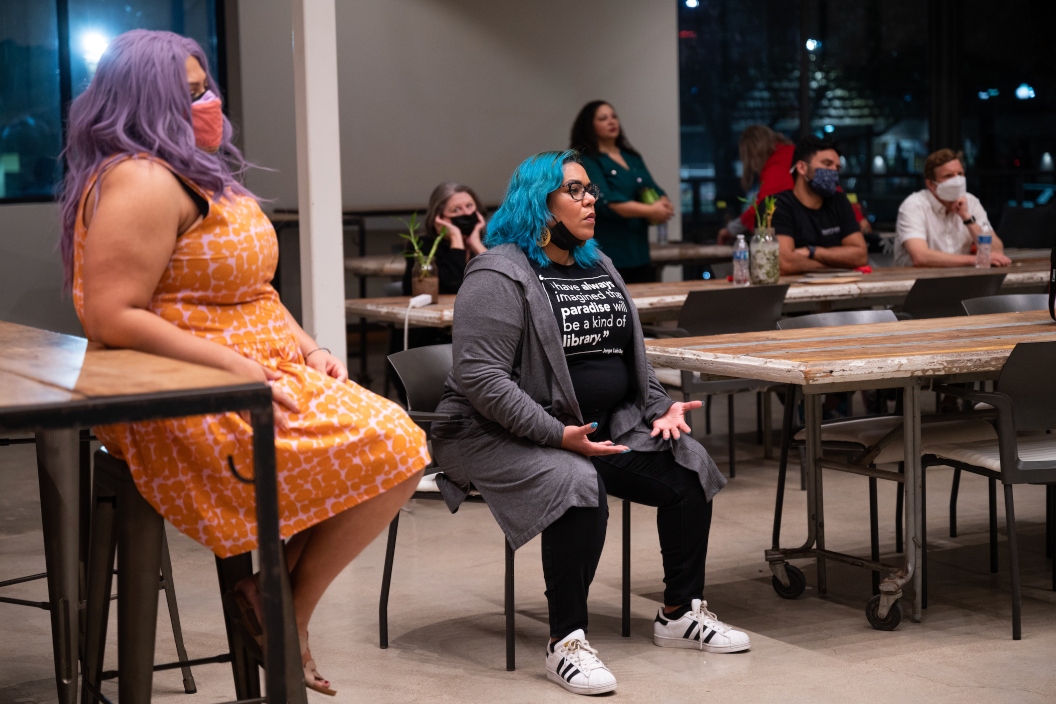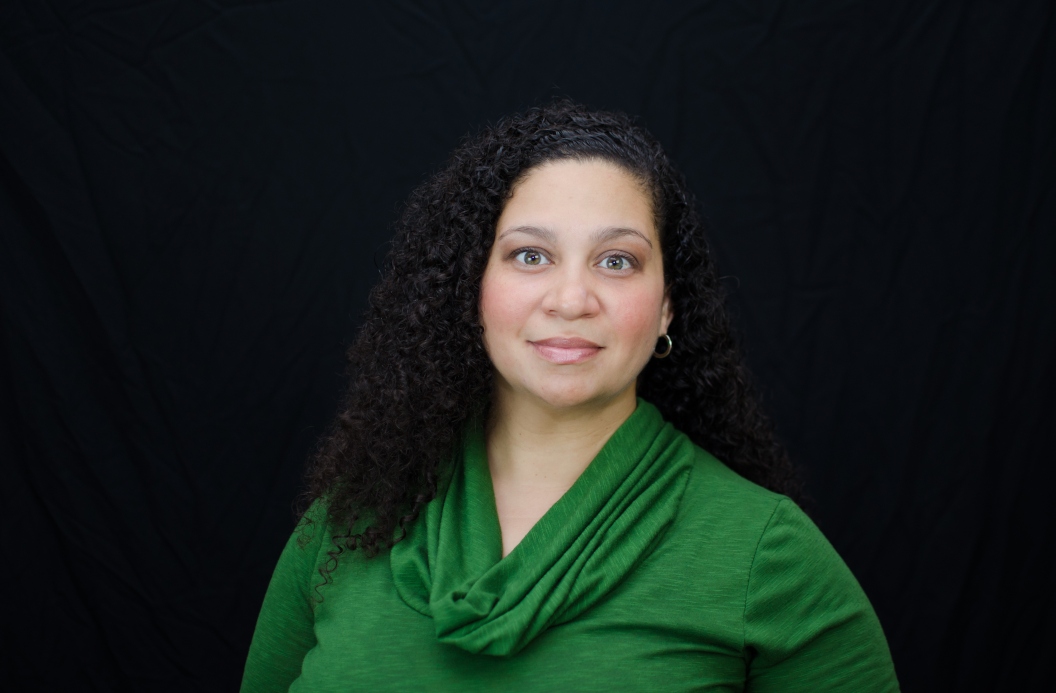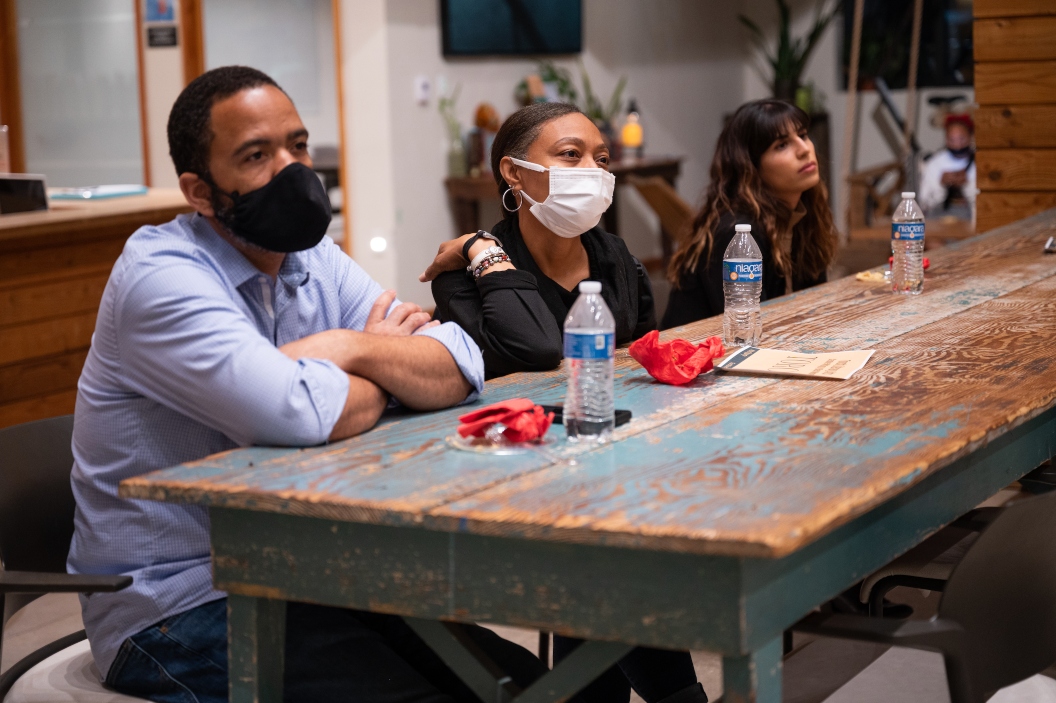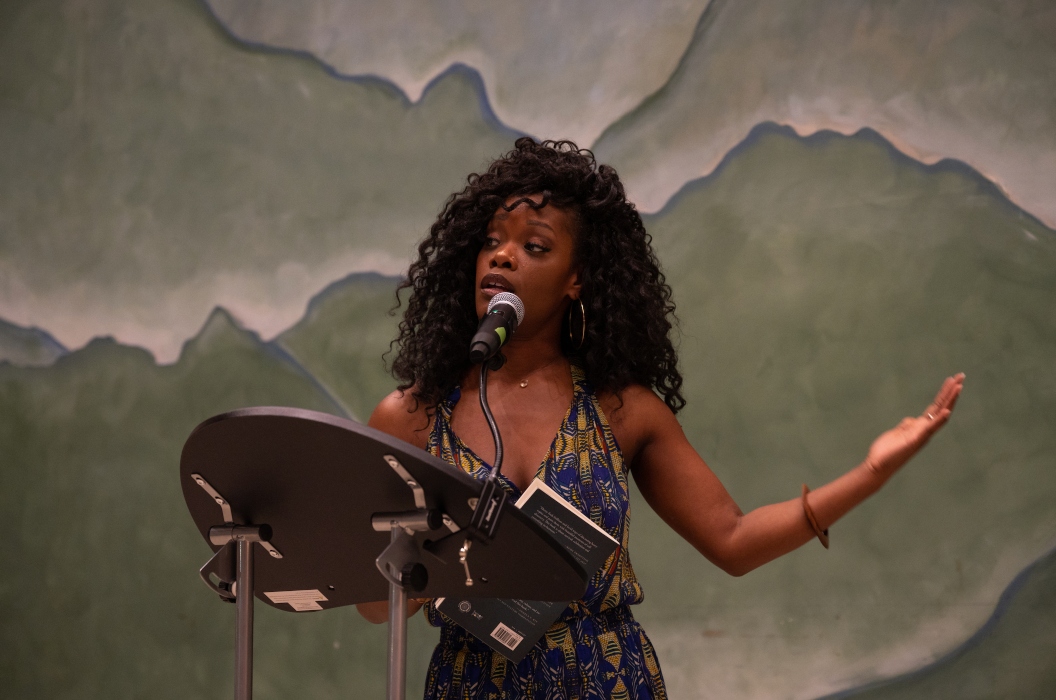Torch Literary Arts celebrates 15 years of amplifying Black women writers.

By Jess Bugg, Photos Cindy Elizabeth
For Torch Literary Arts Founder and Executive Director Amanda Johnston, words have immense power. Born in East St. Louis, IL, and raised in Austin, she pursued poetry with immeasurable passion. She earned a Master of Fine Arts in creative writing from the University of Southern Maine, crafted two chapbooks, GUAP and Lock & Key, and a full-length collection, Another Way to Say Enter.
Her work has not gone unnoticed, receiving numerous fellowships, grants and awards from organizations including the Cave Canem Foundation, The Watermill Center, Tasajillo and the Austin International Poetry Festival. However, the accolades, deserved as they are, pale in comparison to her dedication to those whose voices are often smothered. Along with founding Torch Literary Arts, a nonprofit that publishes and promotes Black women writers, she is a member of the Affrilachian Poets and co-founder of Black Poets Speak Out.
When did you first start writing? Do you remember what first inspired you?
My mother gave me a copy of Shel Silverstein’s A Light in the Attic when I was very young. It was different from the nursery rhyme books I had read before, a bit naughty. And I loved it! Looking back, I see it was the risk he took in his writing that excited me. The form and subjects pushed the boundaries of what I thought poems could be. This early influence stayed with me, and I wrote poems and lyrics as a child.
It wasn’t until 2000 when I married my husband, who was in the Army at the time, and moved from Austin to Fort Knox that I started writing seriously. It was the change in location and cultural environment that sent me to the page for comfort and self-expression. Through writing, I found my tribe in Kentucky with The Heartland Writers and then as an Affrilachian Poet, a writing collective founded by Frank X. Walker, Nikky Finney and others. In 2005, I received a fellowship from the Cave Canem Foundation to attend their summer retreat. That’s when I began to own my voice as a writer and dive deeper into my work.
Have you always identified as a poet, or have you explored other genres?

My work is primarily poetry; however, I’ve written and performed for the stage as an ensemble member of the Austin Project (tAP) at the University of Texas at Austin under the guidance and direction of Dr. Omi Osun Joni Jones and Sharon Bridgforth, and the great Laurie Carlos. My current manuscript, titled Active Threat, is a hybrid of poems, prose and experimental text. I’m interested in how the work can be freer on the page and translate into works beyond the bindings of a book.
What was your thought process when starting Torch Literary Arts?
I started Torch Literary Arts in 2006 to reserve a virtual space for Black women writers. As a Black woman writer, I’ve experienced the challenges of race, class and gender discrimination. I wanted to provide an outlet where other women like me could share their work unapologetically and celebrate each other. Our mission has always been to publish and promote Black women writers on our website. Over the years, we’ve grown to include programs like our Wildfire Reading Series that features authors at local independent bookstores and workshops for writers at all stages of their careers.
Torch Literary Arts recently celebrated its 15th anniversary. Speak about the relaunch and the importance of this milestone.
The relaunch has been amazing. The pandemic has been hard for everyone. Over the last two years, I had time to think and assess how Torch was serving our community. What was needed. Along with my board of directors, we decided to relaunch and build on our years of experience with a stronger foundation and enhanced programs. We applied for and received our 501(c)(3) nonprofit status, created a new publishing model to increase online [author]features to over 64 per year, continued our Wildfire Reading Series in-person and online, provided writing workshops and planned for a week-long retreat in Austin. We also pay all of our featured authors for publishing their work. Everyone should be paid for their work. But as artists, it is also an important sign of validation that will have a lasting impact on their writing careers.
This relaunch is the groundwork to grow Torch Literary Arts into a destination online and in Austin for Black women writers and readers around the world.
Despite Austin’s growth, Black communities here seem to be shrinking. Was it difficult to build a community and an audience for Torch Literary Arts here in Austin?
There has always been an audience for Torch and Black women writers. The real challenge is for primarily non-Black institutions and businesses that benefit from Black culture to see what’s at risk if they don’t engage and invest in Black people. Art and literature from the Black tradition have a profound influence across the nation and the world. The growth Austin is experiencing will not meet its full potential if our cultural history is not preserved, and new opportunities are not created to retain and attract people who value diverse, inclusive communities.
People thrive where they are valued and celebrated. We all benefit when we support each other. I look forward to celebrating Black women writers in Austin and invite everyone to read the stunning work we publish on our website and welcome our features from around the world to join us for impactful programs in the city we love and call home.
Could you tell our readers more about the Wildfire reading series, your workshops and retreats?
Beginning in fall 2022, we will resume our curated Wildfire Reading Series at local independent bookstores. We have held many readings at our beloved Bookwoman, one of the oldest feminist bookstores in the country, and we look forward to hosting events with others like Resistencia Bookstore and Black Pearl Books. Our adult workshops will be facilitated by world-class authors and educators and offer participants dedicated time and space to cultivate their craft. A week-long retreat is in the planning phase for summer 2023. The retreat will include a workshop with an experienced author and ample time for rest and rejuvenation in beautiful Austin. This precious gift of time and support with a group of peers is essential for creatives, especially Black women who may not have this opportunity elsewhere.

Could you speak about the importance of highlighting other Black women in the literary arts?
Visibility and representation matter. Seeing and uplifting Black women writers is vital to preserving our immense literary contributions and inspiring future generations to share their poems and stories with the world. We must amplify each other’s work if we are to see an accurate depiction of the world we share. That can’t happen without the diverse voices of Black women from across the diaspora.
As a writer yourself, what do you look for in submissions?
I want to be intrigued and surprised by the writing. How is the piece crafted? What’s the subject? What risk does the writer take? I’m looking for bold work that challenges preconceived notions of what Black women’s literature should be. I want to see our joy and triumphs, the avant garde and tradition on the page. I want contributors to write freely and submit work they are excited to share with the world.
Do you think the writer/artist has a responsibility to speak out against injustice?
Nina Simone said, “An artist’s duty is to reflect the times.” I agree with her. We must tell the truth about our time and not shy away from the joy and pain of it. We must speak to it all so that we may know and reckon with ourselves.
Why is it important to support organizations like Torch Literary Arts?
Black women writers have a wide and rich history across the literary landscape, but we have a long way to go to reach equality in the publishing industry. In 2020, authors took to Twitter with the hashtag #PublishingPaidMe to share what they were paid for debut collection and subsequent book deals. Sadly, it showed that writers of color, especially Black women, were vastly underpaid in comparison to white authors. But a 2013 Pew Report showed the number one person most likely to read a book is a college-educated Black woman.
My question, then, is what are we doing to address this? How are we supporting Black women writers? What are we offering that number one reader to read? Does she see herself in the pages and on the back cover? Does she see a possible future as a writer herself? Supporting Torch Literary Arts is one way to uplift Black women writers and their work and invest in future generations of authors and readers.
When you support Torch by donating and reading new work on our site, you are saying you value the literary legacy fought for and created by women like Phillis Wheatley, Zora Neale Hurston, Lorraine Hansberry, Maya Angelou, Toni Morrison. You are allying yourself with contemporary writers like Torch features Crystal Wilkinson, Toi Derricotte, Tayari Jones and Elizabeth Alexander. You are investing in emerging voices like Desiree S. Evans, Ebony Stewart and Kindall Gant, whose poem “Elegy for [Redacted],” featured Feb. 18, 2022 on Torch, was her very first publication.

We can’t do this work without the support of our community, and we won’t have a true representation of our human experience without the work of Black women writers.
What is next for Torch Literary Arts?
Torch Literary Arts is growing and strengthening our presence in Austin. We’re actively reaching out to organizations to partner with and increase opportunities for Black women writers. Email us at contact@torchliteraryarts.org if you want to learn more about Torch and how you can help. Subscribe to our newsletter to receive announcements and read new work published every Friday.

